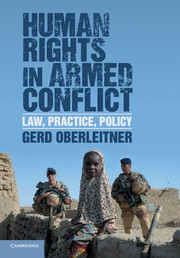Book contents
- Frontmatter
- Contents
- Acknowledgments
- Table of cases
- Table of Legal Instruments
- List of Abbreviations
- Introduction
- Part I Human rights in armed conflict: history of an idea
- Part II Human rights and humanitarian law: theory
- Part III Human rights and humanitarian law: challenges and commonalities
- Part IV The dynamics of war and law
- Part V Enforcement: practice and potential
- 17 United Nations Human Rights Council: monitoring armed conflicts
- 18 United Nations High Commissioner for Human Rights
- 19 United Nations human rights treaty bodies
- 20 The Inter-American human rights system
- 21 The European Court of Human Rights
- 22 The African Commission on Human and Peoples’ Rights
- 23 Monitoring and litigating humanitarian rights: prospects
- Conclusion
- Bibliography
- Index
- References
17 - United Nations Human Rights Council: monitoring armed conflicts
Published online by Cambridge University Press: 05 March 2015
- Frontmatter
- Contents
- Acknowledgments
- Table of cases
- Table of Legal Instruments
- List of Abbreviations
- Introduction
- Part I Human rights in armed conflict: history of an idea
- Part II Human rights and humanitarian law: theory
- Part III Human rights and humanitarian law: challenges and commonalities
- Part IV The dynamics of war and law
- Part V Enforcement: practice and potential
- 17 United Nations Human Rights Council: monitoring armed conflicts
- 18 United Nations High Commissioner for Human Rights
- 19 United Nations human rights treaty bodies
- 20 The Inter-American human rights system
- 21 The European Court of Human Rights
- 22 The African Commission on Human and Peoples’ Rights
- 23 Monitoring and litigating humanitarian rights: prospects
- Conclusion
- Bibliography
- Index
- References
Summary
A mandate for armed conflicts?
The UN Human Rights Council, created in 2006 as successor to the Commission on Human Rights, is at the centre of the UN’s human rights system. The Council’s many functions are laid down in General Assembly Resolution 60/251 of 2006 and include “promoting universal respect for the protection of all human rights and fundamental freedoms for all, without distinction of any kind and in a fair and equal manner,” particularly in “situations of violations of human rights, including gross and systematic violations,” upon which it can make recommendations. The Council is also meant to “respond promptly to human rights emergencies” and “[s]erve as a forum for dialogue on thematic issues on all human rights.” In light of this mandate it comes as no surprise that the Council is regularly confronted with situations of armed conflicts where the kind of grave and serious human rights violations which the Council is meant to deal with are most likely to occur.
The Council has repeatedly held that it is mandated to consider the human rights situation in armed conflicts and that it sees human rights as applicable in such situations. To give one example: in Resolution 9/9 of 2008 on the protection of the human rights of civilians in armed conflict, the Council stated that the protection provided by human rights law continues in situations of armed conflict; that international human rights law and international humanitarian law are complementary and mutually reinforcing; that international humanitarian law has the status of lex specialis; and that certain rights of the ICCPR are non-derogable in times of armed conflict. The resolution was adopted without a vote. The Commission on Human Rights had used similar language in earlier thematic and country-specific resolutions, e.g., in Resolution 2005/34 on extra-judicial, summary or arbitrary executions, where it “[a]cknowledg[ed] … that international human rights law and international humanitarian law are complementary and not mutually exclusive.”
- Type
- Chapter
- Information
- Human Rights in Armed ConflictLaw, Practice, Policy, pp. 241 - 258Publisher: Cambridge University PressPrint publication year: 2015

